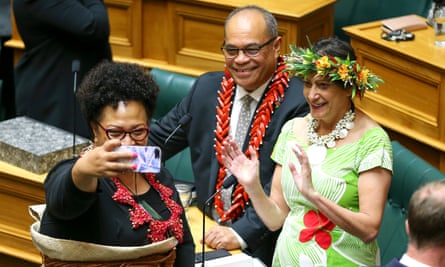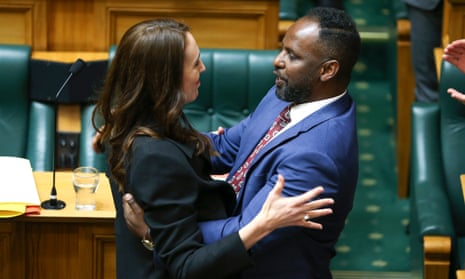Starting any new job, “the first day, you feel nervous,” says Ibrahim Omer, one of New Zealand’s new MPs. “This is no exception.”
The 53rd parliament, which resumes sitting on Tuesday, is the most diverse in the nation’s history, with nearly 50% of the 120 seats held by women, 11% LGBTQI representation and 21% Māori MPs (25 members).
When the parliament was officially opened in November, the oath of allegiance sworn by new MPs was repeated in 10 languages, other than the official English and te reo Māori – the most ever.
Parliament was “quite an intimidating environment” to walk into, says Omer, the first MP of African origin and the second refugee. But within hours, “all my nervousness basically evaporated … We were made to feel welcome.”
Parliament’s diversity has been hailed globally as a sign of the prime minister Jacinda Ardern’s progressive and inclusive politics. New Zealand is now believed to have the highest proportion of LGBTQI lawmakers in the world, plus the most women of all OECD countries.
But Jennifer Curtin, a professor of politics and director of the Public Policy Institute at the University of Auckland, says the step change dates back to 1996, with the introduction of the mixed-member-proportional electoral system.
MMP had been recommended as a replacement for the first-past-the-post system in a relatively radical royal commission report in 1986 – which advised addressing the homogeneity of the house as a step “towards a better democracy”.
“We’ve seen this incremental change in what our representatives look like, and the groups that they come from,” Curtin says. “Even though this is our most diverse – we have been moving towards this moment.”

No demographic exempt from bad behaviour
But as the face of parliament is changing, attitudes within it may be slower to catch up.
The Francis report, published in May 2019, found widespread bullying and harassment within the parliamentary workplace, as well as allegations of sexual assault – and what one staff member described as “casual, rolling racism”.
Parliament has “always been toxic”, says Trevor Mallard, the Speaker of the House, who commissioned the review in his first term – but with the report, “it’s almost like our worst fears were realised”.
No demographic was found to be exempt from bad behaviour, he says: “MPs and staff members in each of those groups were bullies.”
The problems were cultural, including attitudes toward women and minorities; hierarchical and uneven employment relationships; and a high tolerance for bad behaviour embedded over successive governments from the 1970s onwards.
Curtin calls it the “diversity dilemma”: while representation within parliament is increasing, the rules and norms derive from a white “male experience and understanding of politics”.
“The MMP change opened the door to ‘others’ being able to come in, in greater numbers – but in a sense this electoral system change just overlaid a new set of institutional rules on old existing systems, designed to be adversarial or exclusionary.”
Everything from parliament’s hours of business, to the nomenclature, to the makeup of select committees has the potential to shut out representatives historically seen as outside the system, Curtin says.
“Asking them to be the bearers of change is a big challenge. A lot has to be led by those at the top.”
‘What does a good, modern workplace look like?’
Mallard says the commitment is there and transformation is already under way. One of his first and most “dictatorial decisions” as Speaker was, in 2017, to remove references to Jesus Christ from the parliamentary prayer.
It was a controversial move, met with protests, but Mallard says he wanted to set out with a statement about inclusivity.
Similarly, parliament has made progress towards accommodating parents – such as by making it easier for MPs to take personal leave, changing parliament’s sitting hours to end the week earlier, and removing members-only restrictions within the parliamentary buildings and facilities.
In 2019 a video of Mallard bottle-feeding an MP’s baby mid-debate went viral. In practice “it was not a big thing – but it became quite an important symbol,” he says.
“I do think we have an obligation to lead society, [to] say, ‘What does a good, modern workplace look like? Let’s be that.’”
That extends from the parliamentary staff – cleaners and caterers have been paid a living wage since last year – to the highest level of political office, Mallard says.
He singles out Ardern and the National MP Paula Bennett (who was deputy leader when the frontbencher Jami-Lee Ross was accused of sexual misconduct in 2018) for having made clear their expectations of their caucuses.
But especially since the Francis report, the will to improve has been met with structural changes by the Parliamentary Service, the largest employer within the complex, to improve employment processes and stamp out bad behaviour.
As of July last year, 29 of the 85 recommendations of the Francis report had been implemented – including introducing a code of conduct and a diversity committee – with a further 40 under way.
That work continues, says the Parliamentary Service chief executive, Rafael Gonzalez-Montero: “The cultural change is the important thing. Just ticking the boxes and saying we’ve done 85 – that’s not going to do it.”
But every level of government is aligned in the commitment, he says – starting with supporting the new MPs. Indeed, in her review, the independent investigator Debbie Francis singled out “the increasing diversity of members” as a key factor driving positive change within parliament.
Omer says he has heard the stories of the past, where new MPs were left to navigate their own way through parliament: “That’s brutal – it’s such a massive and intimidating environment. If that happened to me, today, it would be difficult.”
But his experience has so far been quite different, with the commitment to change obvious from the prime minister down through Parliamentary Service. From his first day inside Labour’s caucus, Omer says, “she told us that you are welcome”.
“You can clearly see that they have been working hard to make sure that we have a safe space for everyone – that no matter who you are, what your background is, you can come in to contribute.”
Now, Omer says, he “can’t wait” to get started.
